| Srl | Item |
| 1 |
ID:
134521
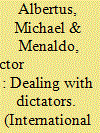

|
|
|
|
|
| Summary/Abstract |
This paper examines how the circumstances of democratic transition affect the consequences of losing office for outgoing dictators. Using data on constitutional origins and democratization from 1875 to 2004, we find that outgoing dictators who are able to impose a holdover constitution during democratization and beyond are less likely to face severe punishment upon relinquishing their rule. These results hold after accounting for alternative explanations of autocrats' post-tenure fate and after using instrumental variables to adjust for potential endogeneity. We also document several mechanisms by which this occurs: proportional representation, the election of right-wing executives, post-transition military influence, and elite control over local politics. The findings suggest that for dictators who fear their ousting in the face of domestic unrest or potential instability, democracy can provide a plausible avenue for protecting their most basic interests.
|
|
|
|
|
|
|
|
|
|
|
|
|
|
|
|
| 2 |
ID:
164170
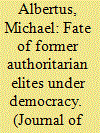

|
|
|
|
|
| Summary/Abstract |
Why do some former authoritarian elites return to power after democratization through reelection or reappointment to political office, or by assuming board positions in state-owned or major private enterprises, whereas others do not and still others face punishment? This article investigates this question using an original data set on constitutional origins and the fate of the upper echelon of outgoing authoritarian elites across Latin America from 1900 to 2015. I find that authoritarian elites from outgoing regimes that impose a holdover constitution that sticks through democratization are more likely to regain political or economic power—especially through national positions where the potential payoffs are largest—and less likely to face severe or nominal punishment. I also find a positive role for political capital among former elites. These results are robust to alternative explanations of authoritarian elites’ fate and using instrumental variables to address potential endogeneity. The findings have important implications for democratic consolidation and quality.
|
|
|
|
|
|
|
|
|
|
|
|
|
|
|
|
| 3 |
ID:
157908
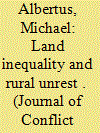

|
|
|
|
|
| Summary/Abstract |
What is the relationship between landholding inequality and rural unrest? And why does land reform that ostensibly addresses rural grievances sometimes exacerbate unrest? We advance the understanding of these longstanding questions by shifting the emphasis from how landholding inequality fuels rural grievances to how it captures the collective action capacity of landowners. Using municipal-level data from Brazil’s large land reform program from 1988 to 2013, we demonstrate that the relationship between landholding inequality and unrest is conditional. Isolated threats to landed elites in the form of land invasions are difficult to repel, generating a positive relationship between landholding inequality and one-off land invasions. By contrast, sustained, broader local threats triggered by nearby land reforms catalyze landowner organization to repel land invasions, leading to the reverse relationship. The findings provide a novel answer for why a straightforward link between land inequality and rural unrest is elusive and may generalize to a broad range of similar cases.
|
|
|
|
|
|
|
|
|
|
|
|
|
|
|
|
| 4 |
ID:
120123
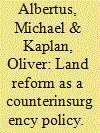

|
|
|
|
|
| Publication |
2013.
|
| Summary/Abstract |
Can targeted land reform reduce levels of civil war conflict by mitigating the factors that contribute to rural rebellion? This article uses new micro-level data on land reform and insurgency at the municipal level from Colombia from 1988 to 2000, a country with high rates of land inequality and informal land ownership, to test whether land reform undercut subsequent guerrilla activity. The reform had two distinct aspects. Politically powerful large landholders blocked most large-scale reform, which resulted primarily in an enduring, low-intensity, and geographically dispersed reform that spurred low levels of insurgent activity. Larger-scale reforms were only implemented in areas that threatened serious violence and had the potential to harm elite interests, and in these limited areas reform reduced guerrilla activity. This suggests that while land reform can be an effective counterinsurgency policy, it may be politically difficult to implement at a sufficient scale because it threatens the status quo.
|
|
|
|
|
|
|
|
|
|
|
|
|
|
|
|
| 5 |
ID:
152233
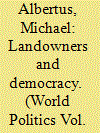

|
|
|
|
|
| Summary/Abstract |
Are large landowners, especially those engaged in labor-dependent agriculture, detrimental to democratization and the subsequent survival of democracy? This assumption is at the heart of both canonical and recent influential work on regime transition and durability. Using an original panel data set on the extent of labor-dependent agriculture in countries across the world since 1930, the author finds that labor-dependent agriculture was indeed historically bad for democratic stability and stunted the extension of suffrage, parliamentary independence, and free and fair elections. However, the negative influence of labor-dependent agriculture on democracy started to turn positive around the time of democracy's third wave. The dual threats of land reform and costly domestic insurgencies in that period—often with more potent consequences under dictators—plausibly prompted landowners to push for democracy with strong horizontal constraints and favorable institutions that could protect their property more reliably over the long term than could dictatorship. The shift in support for democracy by labor-dependent landowners is a major untold story of democracy's third wave and helps explain the persistent democratic deficit in many new democracies.
|
|
|
|
|
|
|
|
|
|
|
|
|
|
|
|